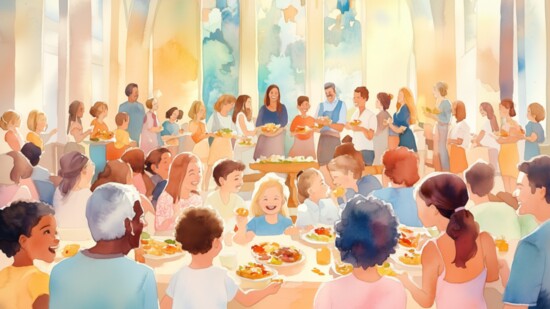It’s not a newsflash to say we live in a time of change. Our world feels different. But even in a disorienting world, hope is always possible, and I have my own story about hope.
I lead a church that has become “somewhere” for lots of people, though not in the way you might think. From that first bottle of hand sanitizer during the pandemic, I knew change was no option. I don’t mean changing our message, our voice, or what we carry in our hearts. Those are what make any house of worship important and necessary. What we needed was a new tool, an idea, a new means to our timeless ends.
We found it. Our church is now a restaurant.
Plenty of churches have kitchens, potlucks, and Wednesday night dinners. That’s not new. In fact, I belong to a denomination where Sunday breakfast is aspirational, as in, you know you’ve arrived when you smell bacon during the early service.
It seems like a lifetime ago, that summer we all stayed home, wore masks, and washed groceries. That summer, I was left alone to roam the halls of Saint Luke’s–that is, until I was approached by a recently retired chef, a church member who owned a popular local eatery.
His big idea was to turn our empty church into a takeout restaurant, keeping the staff employed and giving them something to do. So we chopped, prepped, and packed. I’ll be the first to admit I didn’t go to seminary to learn chopping skills or the proper internal temperature of cooked fish, but it was better than a Zoom meeting.
My soup kitchen pal once noticed that the steam line becomes an impregnable barrier, as the lucky/well-fed/rich people get to drive in and out of downtown while the dirty/hungry/poor people file by, separated from the others by glass and steam, just to receive a ladle full of charity for the day.
The same can be said of any church kitchen, as our steam lines divide us still – but in this case, between those volunteers who know the inside language of a place they love, leaving any hapless visitor who wanders in to learn they don’t belong, possibly leaving with a tray of food but no one speaking to them. Perhaps it’s too much to ask of any volunteer, but a restaurant makes hospitality more possible.
It didn’t take long to see that food was the catalyst. During the pandemic, our new take-out restaurant gave people a reason to get out of the house, to drive under the steeple, and to say hello in person, if only from a car window. We weren’t great at being restaurateurs, either: Food would be late, and cars would be lined up around the block. No one cared. They were home.
That was just a start. When lockdown ended, reentry brought new challenges, namely, what to do with Sunday Breakfast. The steam line was history, and we knew buffets were no longer an option. So, volunteers pre-wrapped breakfast items and piled them high in the center of what had been a parlor.
High-top tables replaced sofas, and QR codes were posted for donations, alongside an offering plate for those who still carry folding money. Then came the lightbulb moment that could well save any church, synagogue, Islamic center, Elks lodge, or any other tired nonprofit organization that has seen membership shrinking or getting older by the minute. Why not leave the food out all morning?
Boom! What an idea. Our former church parlor is the happiest place in town, as generations of old friends and new friends laugh and connect, watch little ones dart after donuts, and just enjoy a minute somewhere.
Of course, not everyone has eyes to see. At a recent denominational event, one of my colleagues said our church sounds more like a convenience store. And why not? Times of change call for new ideas, and who said church can’t be fun in this way? This much I know – we will sell gas and hot dogs if that brings hope and joy to a world with precious little of both.
And here is the best part. While we are munching on sausage biscuits, our profits go to local outreach and disaster relief – profits to the point we were able to write a check for $50,000 to Hurricane relief in Western North Carolina.
The Bible calls this building the Kingdom. I call it hope for the future, barriers broken, and a “somewhere” for so many. This isn’t our past; this is new and different and so much fun. Don’t be afraid to try something new, and always hope.
Adventures await.
